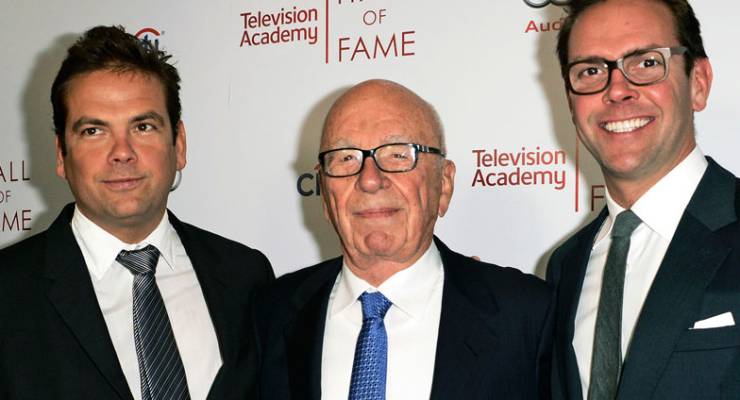
Early Thursday morning (AEDST), 21st Century Fox’s annual meeting will involve some big protests against the board’s recommendations, but there is no direct threat to the Murdoch family control of the company.
That’s because the hostile shareholder resolution opposing the dual-class voting structure is only advisory, so Rupert and his hand-picked directors can choose to ignore it, as they have done consistently over the past 10 years since Stephen Mayne put up the first of these pro-democracy resolutions in 2007.
It was Liberty Media chairman John Malone’s 18% voting stake — and the Saudi Prince Alwaleed bin Talal with 5% — that kept support for the 2007 resolution down to 22.9%, which still represented shares worth about $5 billion at the time.
Malone’s stake was cancelled in exchange for control of DirecTV shortly after the 2007 meeting, lifting the relative voting power of all the remaining holders of the stock. Ever since, the Saudi Prince has backed Rupert against numerous hostile shareholders resolutions so his departure from the Fox register, plus the widely reported negotiations with Disney, has provided added piquancy to this week’s AGM, which will hopefully attract more than a handful of independent shareholders, and more than the zero journalists present for last year’s gathering.
It is worth having a read of the proxy statement for the Fox meeting. The Murdoch Family Trust owns 38.4% of Fox’s voting B-class shares and Rupert Murdoch personally owns another half a per cent in his own name to take the family stake to 38.9%.
San Francisco-based hedge fund ValueAct is disclosed as owning 6.7% of the voting stock, which gives it additional leverage now that the Saudi Prince has sold out.
ValueAct, as its name suggests, has a history of successful activism, such that Rupert moved for peace shortly after they arrived on the scene by appointing its principal Jeffrey Ubben to the board.
Activist shareholders often promote company break-ups so don’t be surprised if the Disney discussions weren’t influenced by Ubben’s desire for the Fox board to “do something” to arrest its sharemarket under-performance.
The orchestrated leaks of the Disney talks certainly did that, lifting Fox shares 10% last week, adding a cool US$5 billion to the company’s market capitalisation.
And if the weekend reports are right that Rupert wants to buy CNN, he would certainly need to sell something chunky to create balance sheet capacity and to allay anti-trust concerns.
The dual-class structure often leads to confusion about the market value and control of 21st Century Fox, so let’s clarify the precise numbers.
As of Friday night, Fox had 798 million Class B voting shares on issue, which were valued at US$22.4 billion (A$29.2 billion) based on the closing price of US$28.06.
Surprisingly, the non-voting shares are currently trading at a premium to the voting stock. There are 1052 million Class A shares on issue, and they are worth US$30.33 billion (A$39.57 billion).
That gives Fox a market capitalisation of US$52.73 billion (A$68.77 billion) and the 17.4% stake controlled by the Murdochs is currently worth A$12 billion. Not bad, if you can get it.
After 21st Century Fox spent US$11.5 billion buying back non-voting A-class Fox shares over the past three years, those shares now only represent 56.86% of the 1.85 billion total shares on issue.
These buybacks of the non-voting stock have actually made the gerrymander less egregious as the Murdoch family is now up to 17.4%, which is far better than the 14% before the buybacks, which is still widely quoted in the press, such as this weekend column in The New Zealand Herald.
That said, it is still totally dodgy to deny a majority of the shares on issue a vote. Such a structure would be illegal in the UK and Australia, and is at the heart of numerous protest votes over the past decade.
Throw in poison pills, a lack of independent directors and that lavish $1 billion in salary and bonuses paid to Murdoch men over the past 20 years, and you can understand why so many major protest votes have unfolded.








Crikey is committed to hosting lively discussions. Help us keep the conversation useful, interesting and welcoming. We aim to publish comments quickly in the interest of promoting robust conversation, but we’re a small team and we deploy filters to protect against legal risk. Occasionally your comment may be held up while we review, but we’re working as fast as we can to keep the conversation rolling.
The Crikey comment section is members-only content. Please subscribe to leave a comment.
The Crikey comment section is members-only content. Please login to leave a comment.